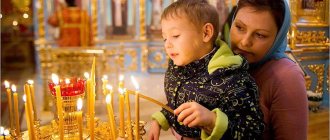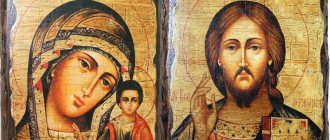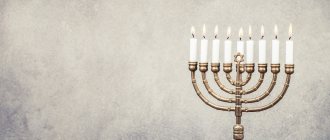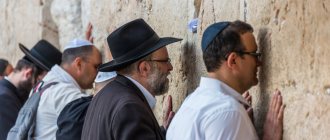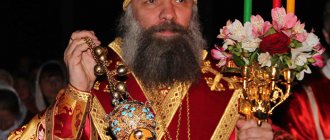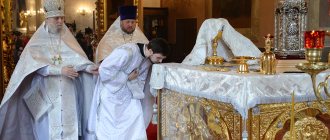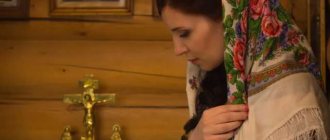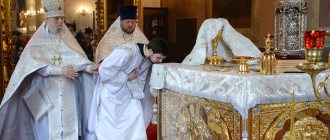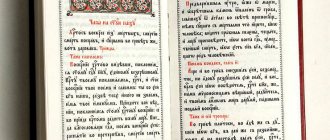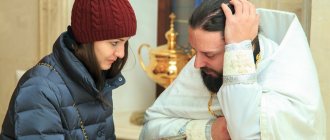Shacharit prayer. Morning blessings
Serving the Almighty begins immediately after awakening. Following the morning blessings is a description of the service that took place in the Jerusalem Temple. After this, the worshiper reads a list of rules according to which it is customary to study and comment on the texts of the Torah.
After waking up say:
I thank You, living and existing King, for by Your mercy You have returned my soul to me. Great is my faith in You.
Blessed are You, Lord our God, King of the universe, Who sanctified us with His commandments and commanded us to wash our hands.
Blessed are You, Lord our God, King of the universe, Who in wisdom created man and created in him numerous holes and cavities. It is open and known to the throne of Your glory that if one of them were opened or one of them was closed, it would be impossible to exist and stand before You for an hour. Blessed are You, Lord, who heals all living things and works miracles.
My God! The soul that You gave me is pure! You created it, You created it, You breathed it into me, and You keep it in me, and You will take it from me and give it back to me in the future. All the time while my soul is in me, I thank You, Lord, my God and God of my fathers, Lord of all creations, Lord of all souls. Blessed are You, Lord, who restores the souls of the dead.
Blessed are You, Lord our God, King of the universe, Who sanctified us with His commandments and commanded us to speak the Torah.
Make it so, Lord, that the words of Your Torah may be a delight in our mouths and in the mouths of Your people, the House of Israel. All of us, both our descendants and the descendants of Your people, the House of Israel, will know Your name and selflessly study Your Torah. Blessed are You, Lord, who teaches Torah to His people Israel!
Blessed are You, Lord our God, King of the universe, Who chose us from among the nations and gave us His Torah. Blessed are You, Lord, Giver of the Torah!
May the Lord bless you and keep you. May the Lord make His face clear for you and have mercy on you. May the Lord turn His face towards you and give you peace.
Here are good deeds for which there are no restrictions: leaving the unharvested edge of the field for the poor, bringing the fruits of the first harvest to the Temple, donating gifts while coming to the Temple, doing charity and studying the Torah.
These are the good deeds, the fruits of which a person eats in this world, but they themselves remain for the world to come, namely: honoring father and mother, charity, coming early to the school house in the morning and evening, hospitality and visiting the sick, helping poor brides in arranging a wedding , seeing off the deceased, concentration during prayer and establishing peace between a person and his neighbor. However, Torah study is equivalent to all of them.
When putting on tzitzit, they say
: Blessed are You, Lord our God, King of the universe, Who sanctified us with His commandments and gave us the commandment of tzitzit.
Blessed are You, Lord our God, King of the universe, Who gave the rooster the ability to distinguish day from night.
Blessed are You, Lord our God, King of the universe, who did not make me an infidel.
Blessed are You, Lord our God, King of the universe, who did not make me a slave.
Blessed are You, Lord our God, King of the universe, who did not make me a woman.
Women say:
Blessed are You, Lord our God, King of the universe, who created me according to His will!
Blessed are You, Lord our God, King of the universe, Who opens the eyes of the blind.
Blessed are You, Lord our God, King of the universe, Who clothes the naked!
Blessed are You, Lord our God, King of the universe, who frees prisoners from bondage.
Blessed are You, Lord our God, King of the universe, Who straightens those who are bowed down.
Blessed are You, Lord our God, King of the universe, Who raises the dry land above the waters.
Blessed are You, Lord our God, King of the universe, who has created everything necessary for me.
Blessed are You, Lord our God, King of the universe, who guides the steps of man.
Blessed are You, O Lord our God, King of the universe, Who girdles the people of Israel with splendor.
Blessed are You, Lord our God, King of the universe, who crowns the people of Israel with glory.
Blessed are You, Lord our God, King of the universe, who gives strength to the weary.
Blessed are You, Lord our God, King of the universe, Who takes away sleep from my eyes and slumber from my eyelids.
And may it be Your will, Lord our God and God of our fathers, to accustom us to Your Torah and instill in us fidelity to Your commandments. And do not lead us into sin, nor into crime, nor into atrocities, nor into temptation, nor into shame. May the evil inclination not prevail over us. And distance us from a bad person and a bad friend. And draw us to a good beginning and to good deeds. And make our beginning submit to You. And grant us on this day and every day to find favor, mercy and mercy in Your eyes and in the eyes of all who see us. And reward us with gracious love. Blessed are You, O Lord, who repays good deeds to His people Israel!
May it please You, Lord, my God and the God of my fathers, to protect me today and henceforth from insolent people and from insolence, from a bad person and from a bad comrade, and from an evil neighbor, and from an accident, and from a mortal enemy, from a difficult trial and an unyielding plaintiff, both Jew and non-Jew.
How beautiful are your tents, O Jacob, your dwellings, O Israel! And I, by Your great mercy, enter Your house, I bow in awe to Your Sanctuary. Lord, I love the abode of Your house and the place of Your Glory. I will bow down and bow my knees before the Lord, my Creator. My prayer to You, Lord, may it be for a time of favor. God, in Your great mercy, answer me with Your true salvation.
Putting on the tallit
Bless the Lord, my soul! Lord my God, Your greatness is boundless, You have clothed yourself with radiance and splendor. Shrouded in light like a cloak, you stretch out the heavens like a canopy.
Blessed are You, Lord our God, King of the universe, who sanctified us with His commandments and commanded us to wrap ourselves in tzitzit.
How precious is Your mercy, O God! The sons of men find protection under the shadow of Your wings. They are satisfied with the rich dishes of Your House, from the stream of Your delights You give them to drink. For with You is the source of life, in Your light we see light. Direct Your mercy towards those who know You and Your justice towards those who are upright in heart.
Putting on tefillin
Before placing tefillin on your hand, say:
Blessed are You, Lord our God, King of the universe, Who sanctified us with His commandments and commanded us to put on tefillin!
Placing tefillin on your head, say:
Blessed are You, Lord our God, King of the universe, Who sanctified us with His commandments and gave us the commandment of tefillin!
After this they say:
Blessed be the name of His glorious kingdom forever and ever!
Wrapping the tefillin strap around your middle finger three times, say:
And I will betroth you to Me forever, and I will betroth you to Me in righteousness and justice, in mercy and mercy. And I will betroth you to Me in fidelity, and you will know the Lord.
The Lord of the Universe, Who reigned even before the creation of the world, from the moment of the creation of the world they began to call Him the King. And after the end of the world, He, the Terrible, alone will remain King. After all, He was, He is, and He will remain forever in His splendor. He is One, and there is no other who can compare with Him. He has neither beginning nor end; He has power and authority. He is my God and living Savior, the stronghold of my destiny in times of trouble. He is my banner and refuge, my refuge and cup in the day when I call upon Him. I entrust my soul to His hand before going to sleep and upon awakening, and together with my soul, my body. The Lord is with me, and I will not be afraid.
Thirteen Fundamentals of Faith
Be exalted, God forever living, and glorified! He exists and there is no limit to His existence. He is One, and there are no others who are so one. It is hidden, its unity has no limits. He has no bodily likeness and no physicality. His holiness is incomparable. He preceded everything that was created. He is the first, and His beginning has no beginning. He is the Lord of the world, and He shows His greatness and royal power to all created things. He generously endowed His chosen ones with prophecy, for His glory. There was no more prophet in Israel like Moses, who saw His image clearly. God gave the true teaching to His people through His prophet, a faithful servant in His House. God will never change or replace His Law with another law. He foresees and knows our secrets, He knows in advance how the matter will end. He rewards the pious according to his merits, and gives punishment to the evildoer according to his villainy. At the end of days He will send Moshiach to redeem those who are waiting for final salvation from Him. God will raise the dead according to His great mercy. Blessed is His forever glorified name!
Our God and the God of our fathers, remember us favorably and turn to us from the eternal heavenly heights, granting salvation and mercy, and remember for our good, Lord our God, the love for You of our forefathers - Abraham, Isaac and Israel, Your servants, and Your covenant, and Your mercy, and the oath that You made to Abraham our father on Mount Moriah. And remember how He bound His son Isaac and laid him on the altar. As it is written in your Torah:
“And it happened after these events: God tested Abraham. And He said to him: “Abraham!” And he said: “Here I am.” And He said: “Take your son, your only son, whom you love, Isaac, and go to the land of Moriah, and offer him there as a burnt offering on one of the mountains about which I will tell you.” And Abraham rose early in the morning, and saddled his donkey, and he took his two young men with him, and Isaac his son, and he split wood for the burnt offering, and he stood up, and went to the place of which God had told him. On the third day Abraham raised his eyes and saw this place from afar. And Abraham said to his youths: “Sit here with the donkey, but the youth and I will go there, worship and return to you.” And Abraham took the wood of the burnt offering and laid it on Isaac his son, and took the fire and the knife in his hand. And they both went together. And Isaac spoke to Abraham his father, saying: “My Father!” And he said: “Here I am, my son!” And he said, “Behold the fire and the wood; where is the lamb for the burnt offering?” And Abraham said, “God will provide for Himself a lamb for a burnt offering, my son.” And they both walked together. And they came to the place that God told him about. And Abraham built an altar there, and he laid out the wood, and bound Isaac his son, and laid him on the altar on top of the wood. And Abraham stretched out his hand and took a knife to kill his son. And the angel of the Lord called to him from heaven and said: “Abraham, Abraham”! And he said: “Here I am.” And he said: “Do not stretch out your hand to the boy, and do not do anything to him. For now I know that you fear God, and you have not hidden your son, your only son, from Me.” And Abraham raised his eyes after this and saw: and behold, a ram was caught in a thicket by its horns. And Abraham went and took the ram, and he offered it as a burnt offering in place of his son. And Abraham called the name of that place: “The Lord will provide”! As they say to this day: “He will be seen on the mountain of the Lord.” And the angel of the Lord called to Abraham a second time from heaven and said: “I swear by me,” says the Lord, “because you did this and did not hide your son, your only son, I will bless you, I will bless you and I will multiply, I will multiply your descendants.” yours are like the stars of heaven and like the sand on the seashore, and your descendants will take possession of the gates of their enemies. And through your descendants all the families of the earth will be blessed, because you have obeyed My voice.” And Abraham returned to his youths, and they rose up and went together to Beersheba, and Abraham dwelt in Beersheba.”
Lord of the world! Just as Abraham, our father, overcame his mercy in order to fulfill Your will with all his heart, may Your mercy overcome Your wrath, which is directed towards us. May Your mercy prevail over Your severity, and treat us, Lord our God, with love and compassion. And according to Your great kindness, turn Your wrath away from Your people, and from Your city, and from Your country, and from Your inheritance. And fulfill for us, Lord our God, what You promised us in Your Torah, written down by Moshe Your servant, as it is written: “And I will remember My covenant with Jacob, and My covenant with Isaac, and I will remember My covenant with Abraham and I will remember the Land of Israel."
May a person always be God-fearing, even when alone. Let him acknowledge the truth and speak the truth in his heart. Let him say, getting up early in the morning:
Lord of all worlds! We do not rely on our righteousness, turning our prayers to You, but for the sake of Your great mercy. What are we, what is our life, what is our good deeds, what is our righteousness, what is our help, what is our strength, what is our might? What can we say before You, our God and God of our fathers? After all, all the mighty are nothing before You, and it is as if there were no illustrious men at all, and the wise are like those devoid of knowledge, and the wise are like those devoid of reason. For the multitude of their deeds seems insignificant, and the days of their life are vanity before You, and man has no advantage over cattle, for all is vanity.
However, we are Your people, the sons of Your covenant, the sons of Abraham, who loved You, to whom You swore an oath on Mount Moriah. We are the descendants of Isaac, his only son, who was placed bound on the altar. We are the community of Jacob, Your firstborn, whom You called Israel and Jeshurun in love and joy.
Therefore, we are obliged to thank You, and praise You, and glorify You, and bless You, and proclaim holiness, and give praise and gratitude to Your Name. Happy are we, how good is our lot and how desirable is our destiny, and how wonderful is our inheritance. Happy are we: rising and lying down, evening and morning, we exclaim twice every day:
Listen, Israel! The Lord is our God, the Lord is One!
Blessed be the name of His glorious kingdom forever and ever!
Love the Lord your God with all your heart and with all your soul and with all your being. And these words that I have commanded you today will be in your heart, and repeat them to your sons, and say them when you sit in your house, when you travel, when you lie down, and when you get up; And you shall tie them as a sign on your hand, and they shall be signs over your eyes, and you shall write them on the doorposts of your house and on your gates.
You were the same before the creation of the world, You are the same after the creation of the world. You are the same in this world, and You are the same in the world to come. Sanctify Your Name above those who sanctify Your Name, and sanctify Your Name in Your world, and with Your salvation exalt and exalt our dignity. Blessed are You, Lord, who sanctifies Your name among many!
You are the Lord, our God in heaven and on earth and in the heights of heaven. Verily, You are the first and You are the last, and besides You there is no God. Gather from the four corners of the earth those who trust in You, let all the inhabitants of the earth comprehend and understand that You alone are God over all earthly kingdoms. You created the heavens and the earth, the sea and everything in them.
Who among all those created by Your hands, among the higher or lower worlds, can ask You: “What are You doing?” Our heavenly Father! Deal with us mercifully for the sake of Your great Name, which is called upon us, and fulfill for us, O Lord our God, what is written: “At that time I will bring you, and at that time I will gather you, for I will give you a name and glory among all the nations of the earth, bringing back your captives before your eyes, says the Lord.”
And the Lord spoke to Moses: “And you will make a copper laver and a copper base for washing, and you will place it between the tent of meeting and the altar, and pour water into it. And Aaron and his sons shall wash their hands and their feet from it. Before they enter the tent of meeting, they must wash themselves with water, so that they do not die, before they go to the altar to worship, to burn incense as an offering made by fire to the Lord. And let them wash their hands and their feet, lest they die. And may this be an everlasting law to them—to him and his descendants for all their generations.”
And the Lord spoke to Moses like this: “Command the following to Aaron and his sons. This is the law of the burnt offering: let it be on the fire, on the altar, all night until the morning, and let the fire of the altar burn on it. And the priest shall put on his linen robe and linen trousers, and shall take up the ashes of the burnt offering which the fire burned on the altar, and shall lay them beside the altar. And let him take off his clothes and put on other clothes, and take the ashes to a clean place outside the camp. And let the fire on the altar burn without going out. And the priest shall burn wood on it in the morning and place the burnt offering on it. And he will burn on it the fat of peace offerings for well-being. Let the constant fire burn on the altar without going out.”
May it be Your will, Lord, our God and the God of our fathers, that You take pity on us and forgive us all our sins, and atone for all our sins, and that You forgive us all our misdeeds. And so that the Temple will be rebuilt again soon, in our days, and we will offer before You a constant sacrifice for our atonement, as You prescribed for us in Your Torah, written down by Moses Your servant from Your mouth, O Most Honored One, as it is written:
And the Lord spoke to Moses thus: “Command the children of Israel and say to them: My sacrifice, My bread for My kindlings, a pleasant aroma for Me, be sure to offer Me in due time. And you will say to them, “This is the burning sacrifice that you must offer to God: two yearling sheep without blemish a day—for a constant burnt offering.” You shall offer one sheep in the morning, and you shall offer another sheep in the evening, and you shall offer as a flour offering a tenth of an ephah of fine wheat flour mixed with a quarter of a yin of beaten oil. This is a constant burnt offering, which was made at Mount Sinai, for a pleasant aroma, as a kindling to the Lord. And with it the libation offering is a quarter of a yen for one sheep; in the sanctuary you shall offer me a libation of strong wine. And offer the other sheep in the evening, as in the morning, with meal and drink offering, a kindling, a pleasing aroma to God.”
And he will slaughter her at the side of the altar, on the north side, before the Lord, and the sons of Aaron, the priests, will sprinkle her blood all around the altar.
May it be Your will, Lord, our God and the God of our fathers, that these words be as important, desired and accepted by You as the daily sacrifice itself, made at the right time, in the indicated place and in the right way.
You are the Lord our God, before whom our fathers burned incense while the Temple still existed, as You commanded us through Moses Your prophet, as it is written in Your Torah:
And the Lord said to Moses: “Take for yourself incense: fragrant resin, and onyx, and khelbena, spices, and pure levana in equal proportions. And make of it an incense mixture, prepared by a blender, mixed in purity and holiness. And grind a fine part of it, and place a part of it before the Ark of the Covenant in the tent of meeting, where I will appear to you, and it will be completely holy to you.” And it is said: “And Aaron will burn fragrant incense on it. Every morning, when he trims the lamps, let him burn incense. And when Aaron lights the lamps at evening, let him burn incense, the constant burning of incense before the Lord, which is commanded to all your generations.”
The sages taught: how to prepare a mixture for incense? It weighed 368 mane: 365 mane according to the number of days of the solar year, mane daily - half in the morning and half in the evening, and the remaining three mane, of which the high priest brought a full handful into the Holy of Holies on Yom Kippur, and which he again put in the stupa on the eve of Yom Kippur and thoroughly ground it, turning it into the finest powder. There were eleven types of incense in this mixture, and here they are: incense resin and onyx, chelbena and levana - each substance weighing 70 mane, myrrh and cassia, spikenard stems and saffron - 16 mane each, costa - 12 mane, Indian cinnamon - 3 mane and regular cinnamon - 9 mane. In addition, karshina soap - 9 kava, Cypriot wine - 3 sea and 3 kava, if there is no Cypriot wine, old white wine will do; Sodom salt - 1/4 kava and a little smoky grass. Rabbi Nathan of Babylon says: it also included some amber from the Jordan Valley. An admixture of honey defiles the entire composition. And if you don’t add one of these substances, it means death.
Rabban Shimon, son of Gamliel, says: fragrant resin is nothing more than the resin that drips from the balsam tree. Carshine soap - why is it needed? To give beauty to onyx, to make it beautiful. Cypriot wine, why is it needed? Onyx was soaked in it to make it stronger, but the water from the Raglaim spring was also suitable, but they did not bring it into the sanctuary for the sake of decency.
Rabbi Nathan says: when rubbing aromatic substances, they say: “Rub well, rub well!”, because the sound of the voice improves the incense. If the mixture is prepared in half quantity, the composition is suitable. We don’t know about a third or a quarter of the amount. Rabbi Yehuda said: Here is the general rule: if the proportion is met, half the amount is good. And if you don’t add one of these substances, it means death.
Bar-Kapara says: once every 60 or 70 years, half of the total required amount was collected from the leftovers. And Bar-Kalar also taught: if a little honey were added to the composition, then a person would not be able to resist its smell. Why don't they add honey to it? Because the Torah says: “You shall not burn any leaven or honey in the fire as a sacrifice to the Lord.”
3 times:
The Lord of hosts is with us, the God of Jacob is our strength.
3 times:
Lord of hosts! Happy is the man who trusts in You.
3 times:
3 times: Lord, help! May the King answer us on the day we cry.
You are my refuge, from the enemy You protect me, with the song of deliverance you will surround me forever. And the Lord will be pleased with the gift of Judah and Jerusalem, as in the days of old and as in the years of old.
Abbaye described the order of daily service in the Temple according to tradition and in accordance with the opinion of Aba Shaul: the laying of a large woodpile on the altar is carried out before the laying of a second woodpile for incense. The second woodpile for burning is laid before the two logs are laid. The placement of two logs precedes the clearing of the ash from the inner altar. The cleansing of the inner altar from the ashes precedes the cleansing of the five lampstands. The purification of the five lamps is the sprinkling of the blood of the daily sacrifice. The sprinkling of the blood of the daily sacrifice precedes the cleansing of the two lamps. Cleaning two lamps - burning incense. The burning of incense precedes the burning of parts of the daily sacrifice. Burning parts of the daily sacrifice - the flour offering of mincha. Mincha precedes the gift baked in a frying pan. A gift baked in a frying pan for a libation of wine. Libation of wine for additional victims. Additional sacrifices are to bowls of levana. Bowls with levana precede the evening sacrifice, as it is written: “And he will place the burnt offering on a large pyre and burn the fat of the peace offerings on it.” This completes all daily sacrifices.
O, by the great power of Thy right hand free the one bound by fetters.
Accept the prayer of Your people, strengthen and cleanse us, O Terrible One!
O Mighty One! Guard those who proclaim Your unity as the apple of your eye.
Bless, cleanse them and have mercy, bestow upon them invariably Your mercy.
Unshakable, Holy! Guide Your community according to Your great kindness!
The only one, the highest, turn to Your people, who remember Your holiness.
Accept our prayer and hear our cry, O Knower of the secret! Blessed be the name of the glory of His kingdom forever and ever!
Lord of the Worlds! You commanded us to offer the daily sacrifice at its appointed time and to be for the priests in their service, and for the Levites in their choirs, and for the people in their place. And now, because of our sins, the Temple has been destroyed, the daily sacrifice has been abolished, and we have neither a priest in his service, nor a Levite in his choir, nor a people in his place. Therefore, may it be Your will, our Lord and God of our fathers, that the prayer of our lips be counted, and accepted, and desired by You, as if we had offered the daily sacrifice at its time, and in its place, and according to the rules for it.
In the New Moon:
And in your new moons, offer a burnt offering to God: two young bulls, and one ram, and seven yearling sheep, without blemish. And three tenths of an ephah of fine flour mixed with oil is a flour gift for one ox. And two tenths of an ephah of fine flour mixed with oil as a meal gift for one ram. And one tenth of an ephah of fine flour mixed with oil as a meal offering for each sheep. It is a burnt offering, a sweet-smelling offering, a fire sacrifice to God. And their drink offerings were half a hin of wine for an ox, and a third of a hin for a ram, and a quarter of a hin for a sheep. This is a burnt offering from month to month, in all months of the year. And one goat as a cleansing sacrifice to God - in addition to the constant burnt offering this must be done - and a drink offering of wine.
(1) Where was the place where the sacrifices were made? The most holy sacrifices were slaughtered on the north side of the altar. The bull and goat of the Day of Atonement were slaughtered on the north side and their blood was collected in a vessel for service on the north side. Their blood was to be sprinkled between the poles, and on the veil, and on the golden altar. Missing one of the sprinklings rendered the sacrifice invalid. The priest poured out the remaining blood at the base of the outer altar from the west. However, if he did not do this, the sacrifice was not invalidated.
(2) The calves that were burned were slaughtered on the north side, their blood was collected in a vessel intended for service on the north side. Their blood was to be sprinkled on the veil and the golden altar. Missing one of the sprinklings invalidated the whole thing. The priest poured the remaining blood to the base of the outer altar from the west, but if he did not do this, everything did not become invalid. Both victims were burned at the place where the ashes were taken out.
(3) Purification sacrifices on behalf of the community and private individuals, goats brought on new moons and holidays, were slaughtered on the north side and their blood was collected in a vessel intended for service on the north side. Their blood was to be sprinkled four times on the four horns of the altar. How did this happen? The priest walked up the ramp and, moving along the ledge, approached the southeast, northeast, northwest and southwest ledges. He poured the remaining blood to the base of the altar from the south. The meat of sacrificial animals, prepared in any form, was eaten by male priests inside the courtyard on the day of the sacrifice and at night until midnight.
(4) The burnt offering, one of the most holy sacrifices, was slaughtered on the north side and its blood was collected in a vessel intended for service on the north side. Her blood had to be sprinkled twice on two opposite protrusions, which was four. The skin of the sacrificial animal was removed, it was cut into pieces and the whole was set on fire.
(5) Peace offerings made by the community and sacrifices made for offenses. Offenses for offenses include: a sacrifice for robbery, a sacrifice for the use of property dedicated to the Temple, a sacrifice for an engaged slave, a Nazarene’s sacrifice, a leper’s sacrifice, a guilty sacrifice for someone who doubts whether the action he has performed requires a cleansing sacrifice. These victims were slaughtered on the north side and their blood was collected in a vessel intended for service on the north side. With their blood it was necessary to make two sprinklings, which was four. The meat of sacrificial animals, prepared in any form, was eaten by male priests inside the courtyard on the day of the sacrifice and at night until midnight.
(6) The thanksgiving offering and the ram of the Nazarene are among the less holy sacrifices; they were slain in any part of the courtyard. With their blood there were two sprinklings to be made, which was four. Anyone in any part of the city could eat the meat of sacrificial animals, prepared in any form, on the day of the sacrifice and at night until midnight. This also applies to parts given to clergy. But these parts could only be eaten by the clergy, their wives and children, and slaves.
(7) Peace offerings are less holy offerings and were slaughtered in any part of the courtyard. With their blood there were two sprinklings to be made, which was four. Anyone in any part of the city could eat the meat of sacrificial animals, prepared in any form, for two days and one night. This also applies to the parts allocated for clergy. But only the clergy, their wives and children, and slaves could eat what was allocated.
(8) Firstlings, tithes of livestock, and the Passover sacrifice are among the less holy sacrifices. They were slaughtered in any part of the yard. Their blood was to be sprinkled once at the base of the altar. There were differences in how the meat of these sacrificial animals was eaten: the firstborn of livestock could only be eaten by priests, but the tithe of livestock could be eaten by any person. They are eaten in any part of the city, prepared in any form, for two days and one night. But the Passover sacrifice can only be eaten at night, only before midnight, and only by those for whom it is intended, and only baked over fire.
Rabbi Ishmael says: The Torah is studied by thirteen methods. 1. “Easy and difficult.” 2. A judgment based on the similarity of words or sentences. 3. “Main structure” (inference based on one or two verses of the Torah, establishing a precedent). 4. From a general rule to a particular one. 5. From a particular rule to a general one. 6. General, particular and general - one should judge by the particular. 7. The general, which needs the particular, and the particular - in the general. 8. Everything that was implied by the general statement and was highlighted specifically for teaching in order to reveal new data, was highlighted not for the sake of teaching only about oneself, but also to clarify this general thing. 9. Everything that was implied in general is highlighted specifically to prove the particular, a statement similar to it, highlighted in order to facilitate, and not complicate, the particular. 10. Everything that was implied in general is highlighted specifically to prove a different, non-similar statement, highlighted both in order to make it easier in one respect and to complicate it in another. 11. A conclusion that has already been included in the general rule and then isolated from it for the analysis of a new question is not included in the general rule again, unless the text of the Torah clearly indicates this. 12. The conclusion arising from this text and the conclusion from its final part. 13. And finally, two verses of the Torah, perceived as contradicting one another, can be understood through a third one that harmonizes them.
May it be Your will, Lord, our God and the God of our fathers, that the Temple will soon be erected in our days, and give us a share in Your Teaching. And there we will serve You with trembling, as in days of old and as in years past.
Rabbinical Kaddish
May His great name be magnified and hallowed in the world that He created according to His will, and may He reveal His reign, and increase His salvation, and hasten the coming of His Moshiach during your lifetime, and in your days, and during the lifetime of the entire house of Israel, soon, in the near future. And shout: Amen!
Blessed be His great name always and forever. May the name of the Holy One, blessed be He, be blessed and exalted, honored and magnified, and exalted, and venerated, and magnified, and glorified ( in the Ten Days of Repentance:
and above) all the blessings, and chants, and praises, and words of tenderness spoken in the world. And shout: Amen!
And over the people of Israel, and over our teachers, and over their students, and over the students of their students, and over all those who study the Torah who live in this place or in any other place - may we send you great peace and good will and mercy, and mercy, and long life, and abundance of food, and salvation are from their Father who is in heaven. And shout: Amen!
May great peace and good life come from heaven to us and to all Israel. And shout: Amen!
May He who creates peace on His heights, in His mercy create peace for us and for all Israel. And shout: Amen!
Psalm hymn for the consecration of the Temple: I exalt You, Lord, for You raised me up and did not allow my enemies to triumph over me. Lord, my God! I cried out to You and You healed me. Lord, You brought my soul out of hell, You revived me, so that I would not go into the abyss. Sing to the Lord, zealots of Him, extol the holiness of His Name. For His anger will last only a moment, but life will pass in His favor. In the evening a person will lie down crying, and in the morning he will get up with joy. I said in my serenity: I will never be shaken. Lord! By Your will You have made my mountain unapproachably powerful. When You hid Your face, I was afraid. To You, Lord, I cry, I pray to my Master: What profit is there in my blood, in the fact that I go to the grave. Will the dust glorify You, will it proclaim Your truth? Hear, Lord, and have mercy on me, help me. You turned my mournful cry into dancing, You untied my sackcloth and girded me with joy. Therefore, my soul will sing to You without ceasing. Lord my God, I will thank You forever.
Mourner's Kaddish
May His great name be magnified and hallowed in the world that He created according to His will, and may He reveal His reign, and increase His salvation, and hasten the coming of His Moshiach during your lifetime, and in your days, and during the lifetime of the entire house of Israel, soon, in the near future. And shout: Amen!
Blessed be His great name always and forever. May the name of the Holy One, blessed be He, be blessed and exalted, honored and magnified, and exalted, and venerated, and magnified, and glorified ( in the Ten Days of Repentance:
and above) all the blessings, and chants, and praises, and words of tenderness spoken in the world. And shout: Amen!
May there be great peace from heaven and good life for us and for all Israel. And shout: Amen!
May He who creates peace on His heights, in His mercy create peace for us and for all Israel. And shout: Amen!
Prayers on Saturday and holidays
1. The fourth, final blessing “Shema” in “Maariv” at the onset of Shabbat (“Give us... to go to sleep in peace”) is shorter than on weekdays. At the words “And spread Your peaceful tent over us,” they get up to listen to “Hatzikadish” and then pray the “Amidah” (which is similar to the “Shemonee Esreh” of everyday life).
If the person praying mistakenly finished this blessing in the same way as on weekdays, but came to his senses immediately, he needs to correct the mistake: “...Spreading the peaceful tent...”, etc. But if he remembered this only a few seconds later, there is no need to repeat the blessing.
2. After the “Amidah”, read in a whisper, all those praying in chorus recite a passage from the Torah about the seventh day of Creation, the first Saturday in the history of the Universe: “And they were completed...” (Breishit, 2:13). Since this is evidence of the creation of the world by the Almighty, one must stand while doing so, since, according to the law of the Torah, evidence is given only while standing.
The chazan then recites a blessing that briefly outlines the themes of the seven blessings that make up the Shabbat Amidah. It is customary that the middle section of this blessing (“Defender of the Fathers…”) is pronounced by all those present together with the chazan. The one who prays the Shabbat “Maariv” without a “minyan” does the same.
This blessing is also read on Saturdays that coincide with holidays, but if the first day of Passover falls on Saturday, it is not read.
3. On Shabbat, it is customary to start praying “Shacharit” later than on weekdays, since sleep is one of the pleasures of Shabbat.
4. On Saturdays and holidays, in addition to the usual three prayers, a fourth, additional prayer is read (its name in Hebrew is “Musaf” and means “additional”). The time for reading it is from the end of “Shacharit” to the end of the 7th solar hour, and in extreme cases - all day.
5. On Shabbat “Minchah”, before the Torah scroll is brought out, a verse from Tehillim (69:14) is recited: “And I pray to You in the hour of Your favor...”. This is gratitude to the Almighty for the fact that He distinguished us from other peoples of the world, where it is customary, after eating and drinking, to give free rein to our instincts and do whatever comes into our heads. In our country, even the most frivolous people, after a hearty Shabbat meal, come to the synagogue to listen to the Torah reading.
On a holiday that coincides with a weekday, the Torah is not read at Minchah and, accordingly, “And I pray...” is not said. However, on Shabbat, even when the minyan does not have a Torah scroll, this verse is still recited before the Hatzikadish that precedes the Amidah.
After repeating the Amida, it is customary for the hazan to read three quotations from Tehillim, which speak of the justice of the Almighty. They remind us of the three great righteous people who died on the Sabbath: Joseph, Moses and David. If the Sabbath coincides with a day when Tachanun is not recited, these quotations are not recited (except when Minchah is prayed on the Sabbath in the mourner's home).
6. When, during the reading of the “Amidah” on Shabbat (or a holiday), after the first three blessings, by inertia they continue to say the text of the everyday “Shmonee Esre”, then, having noticed an error, you should finish the blessing started, and then move on to the corresponding place in the Shabbat or holiday “Amidah” " The reason for this establishment is that, in general, on Shabbat or a holiday one could recite the entire “Shmonee Esre” and, as in Roshkhodesh,
mention the peculiarity of this day in the 17th blessing (“Rtse”), but in honor of the holiday and Saturday, the sages established a shortened version of this prayer. Therefore, in this case, it is allowed to read the blessing that has begun to the end - after all, in principle, it could be read on Saturday and according to the letter of the law.
This rule applies even when the worshiper managed to utter only one word, “You...” from the 4th blessing of everyday life. On Shabbat “Shacharit” and “Musaf”, you must first finish the weekday blessing you started, and only then read what you need to read. However, in the Shabbat “Maariv” and “Mincha” the middle section of the “Amidah” also begins with the word “You ...”, and therefore, having said only this word and remembering that today is Saturday, one can continue “... sanctified” (in “Maariv”) or “...one, and Your name is one” (in “Minch”).
All this is true for the case when the worshiper really forgot that today is Saturday. But if he knew about this, but mechanically, out of habit, began the next blessing with the word “You”, it does not need to be completed. As soon as he realizes the mistake, he must break off the everyday text and read the Saturday (or holiday) text.
If he did not remember his mistake until he began the last three blessings of the Amidah, then he also breaks off at the word where he left off and begins the middle section of the Saturday or holiday Amidah. And when I came to my senses only after the end of the final blessing (“Give Peace”), there was nothing left to do but read the prayer from the beginning.
7. The sages say that such a mistake - reading a weekday prayer on Saturday - is a bad sign, and the one who committed it is obliged to carefully analyze his actions, repent of his sins and make a firm decision not to repeat them in the future.
8. If the Shabbat prayers were mixed up - for example, in "Mincha" they began to read the middle section of the "Amidah" of the "Shacharit" prayer - having come to your senses before the end of the blessing, you need to correct the mistake. But, remembering this only after it, there is no need to repeat the prayer, since the main point in the three main Saturday prayers (mention of Saturday) is the same.
The exception is “Musaf”: whoever read its middle section in any other Saturday prayer did not fulfill his duty, since he did not mention the “Musaf” sacrifice. The same applies to the case if you made a mistake in reading the middle section “Musafah” in any other of the Shabbat prayers. Therefore, in these cases, the error should be corrected (as stated above in paragraph 6).
9. Having mistakenly finished the middle section of the Amidah on a holiday the way it is finished on the Sabbath, one must immediately correct it by saying: “Sanctifying Israel during the holidays.” If the worshiper remembered this mistake, having already begun the next blessing, he should interrupt and begin again with the words “You have chosen us...”.
Chapter 78
Kiddush and Shabbat meals
1. “Remember the Sabbath day to sanctify it” (Shemot 20:8) is a commandment that we are obliged to perform certain ceremonies before the beginning of the Sabbath and at its end. These ceremonies are Kiddush and Havdalah. The sages decreed that both Kiddush and Havdalah should be performed over a glass of wine.
2. It is highly advisable to have old, aged wine for Kiddush. If wine cannot be obtained, Kiddush is said over the bread. Then netilat yadayim
for the meal, they perform it not after, but before “Kiddush” (since its reading is not a break between
netilat yadayim
and the beginning of the meal), instead of blessing over the wine they say “Blessed is... the one who grows bread from the ground”, and the phase after the end of “Kiddush” the bread is cut and start eating it.
3. “Kiddush” upon the onset of Shabbat or a holiday is usually performed while standing, on the day of Shabbat or a holiday - sitting (however, slightly rising when pronouncing the blessing over the wine).
4. According to the principle “In a multitude of people there is a king’s splendor,” one person can perform Kiddush for many. However, in order for the one who listens to the Kiddush to be counted as having completed it, it is necessary to listen to it from beginning to end, without skipping a single word, and to answer “Amen” to both blessings. The words “Blessed is He, and blessed is His name” should not be said.
There is a custom, while listening to Kiddush, to repeat to oneself word for word what the person making it says.
5. The commandment about Kiddush and Gavdalah applies equally to both men and women.
6. The glass for making Kiddush must be intact, without chips or cracks, clean and hold at least 86 ml. Before starting Kiddush, the glass should be washed inside and out, or at least thoroughly wiped with a napkin.
7. The glass should be filled to the brim with wine. If someone drank from a glass before making Kiddush, he rendered the wine unsuitable. To fix this, you need to add wine to a glass.
8. It is customary to take a glass with the right hand, pass it to the left and lower it onto the palm of the right hand, the four fingers of which are slightly bent and the thumb lies flush with the palm. The glass is raised above the table by 2025 cm.
9. The bread should be covered with a clean white napkin or towel - it does not matter whether Kiddush is performed on bread or wine. This symbolizes man -
the wonderful bread with which the Almighty fed the Jews after he brought them out of Egypt: when
the man
appeared around the camp in the morning, it was covered with dew.
10. Having finished reading the text of Kiddush, the one who performs it sits down and drinks wine from a glass - preferably most of it. It is commendable if he lets everyone present taste the wine from the Kiddush glass.
11. Before making Kiddush, both in the evening and during the day, it is forbidden to eat or drink anything (even water).
12. If there is no wine, it is advisable to make the daily Kiddush with some other drink, but not with bread. However, it is not recommended to take strong alcoholic drinks for this, so that you can drink most of the glass without stopping, as expected.
13. Both the evening Kiddush and the daytime Kiddush should be performed only where the meal will take place. A person does not fulfill his duty regarding Kiddush not only when he does it in a house other than the one in which he intends to eat, but even if, having begun to read Kiddush, he intends to go to another place.
You must start eating immediately after Kiddush - otherwise, its completion also does not count as fulfilling the mitzvah. If you are not going to eat a full meal immediately after Kiddush, it is enough to have a light snack of sweet baked goods and drink at least 86 ml of wine, and then say the “Triple Blessing”: “For food and livelihood, for the vine and the fruit of the vine.” . It is permissible to do this even before Musaf if you feel severe hunger that prevents you from praying. (But you should not eat more than 57 g of flour products - unlike fruits, the amount of which is not limited by Halacha.)
14. According to Kabala, one must begin the evening Kiddush after the 7th hour from astronomical noon (ordinary, not solar, hour). Seasonal changes in the time of sunrise and sunset are not taken into account and Kiddush is not performed until the 7th hour has passed from the average time of noon (between its extreme points - summer and winter).
15. Both men and women are required to participate in the three Shabbat meals. One of the meals is held at night, after the onset of Shabbat, and two during the day, after the Shacharit, Musaf and Minchi prayers. Halacha places great importance on the third Sabbath meal.
It is advisable to eat bread during this meal - at least a little, only 57 g (kabeets),
therefore, one should not eat to the full during the second morning meal. Bread can be replaced with flour products; before eating them, the blessing “Creator of various types of food” is said, and then “Triple blessing”. In the most extreme case (for example, when “Shacharit” is finished late), fruit can be eaten as a third meal. However, the third meal should not be canceled altogether, since, according to the Kabala, its time is a time of special favor from above. One of the sages of the Mishnah even says about this: “May my lot be the same as that of those who eat the third Shabbat meal!”
16. On Shabbat and holidays, the blessing “He who grows bread from the ground” is pronounced over two challahs (“double bread”). When pronouncing this blessing, they take both challahs in their hands, but first cut only one: according to custom, in the evening - the left one, in the afternoon - the right one. It is also customary for the challahs to lie one next to the other in the evening, and during the day for the right one to partially lie on the left.
Before pronouncing the blessing, they mark (without cutting!) on the challah with a knife the place where they will cut (cf. above, 44:2).
On Saturday, the blessing over the “double bread” is said every time you start eating. This is done in memory of the fact that in honor of the Sabbath, the Almighty gave our ancestors in the desert a portion of mana
twice as much as on weekdays.
This is how the Torah hints at this: “And the Lord blessed the seventh day” (Breishit 2:3) - blessing means increase, abundance, and in mana
this was manifested in the most obvious way.
17. It is not necessary for each person participating in the meal to have “double bread” - it is enough for the host to say a blessing over two challahs.
There is a custom according to which each of those sitting at the table, having received his piece of bread, also whispers the blessing “He who grows bread from the ground.”
18. It is forbidden to fast on Saturday even for a short time with the corresponding intention. But even without it, it is forbidden to eat anything before noon.
19. On Saturday, one must refrain from expressing grief, worries, worries, etc. Instead, it is better to pray to the One who is the source of mercy and compassion.
20. Halacha recommends eating more sweets and fruits on Shabbat, as well as inhaling aromas. Firstly, thanks to this, more blessings are pronounced (which compensates for their smaller number than on weekdays in Shabbat prayers), and secondly, this helps create a festive Shabbat mood.
21. Another of the pleasures of Saturday is sleeping during the day. However, halakhah prohibits sleeping during the day with the intention of resting before work ahead after the Sabbath.
22. The Torah says: “And the seventh day shall be holy to you, a day of complete rest dedicated to the Lord” (Shemot 35:2). This means that physical rest is a relatively unimportant aspect of the Sabbath rest. The Almighty freed us from work on Saturday so that we could take care of the needs of our souls. Therefore, during Shabbat meals it is customary to sing special Shabbat songs (zmirot),
written by the greatest Jewish poets and sages, and in between courses they talk about Torah topics - most often about the portion of the Torah that is read in the synagogue on this Saturday. After resting during the day, the rest of the time is devoted to Torah study. Our sages said: “Sabbaths and holidays were given to Israel only for the purpose of studying the Torah on these days.” Working all week, many do not have enough time and energy to study Torah properly. Therefore, it is they, more than those who devote all their time to studying the Torah, who are obligated to study the Torah on Shabbat and holidays.
Chapter 79

